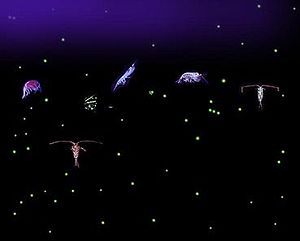
Planktology
Encyclopedia
Planktology is the study
of plankton
, various microorganism
s that inhabit bodies of water
. The field encompasses a variety of topics, including primary production
, and energy flow
. The carbon cycle
is a recent area of interest.
 Plankton drive the "biological pump
Plankton drive the "biological pump
", a process by which the ocean
ecosystem
transports carbon
from the surface euphotic zone to the ocean's interior. Such processes are vital to carbon dioxide sink
s, one of several possibilities for countering global warming
. Modern planktology includes behavioral aspects of the microorganisms, engaging modern in situ
imaging devices.
Some planktology projects allow the public to participate online
, such as the Longterm Ecological Observatory.
Research
Research can be defined as the scientific search for knowledge, or as any systematic investigation, to establish novel facts, solve new or existing problems, prove new ideas, or develop new theories, usually using a scientific method...
of plankton
Plankton
Plankton are any drifting organisms that inhabit the pelagic zone of oceans, seas, or bodies of fresh water. That is, plankton are defined by their ecological niche rather than phylogenetic or taxonomic classification...
, various microorganism
Microorganism
A microorganism or microbe is a microscopic organism that comprises either a single cell , cell clusters, or no cell at all...
s that inhabit bodies of water
Water
Water is a chemical substance with the chemical formula H2O. A water molecule contains one oxygen and two hydrogen atoms connected by covalent bonds. Water is a liquid at ambient conditions, but it often co-exists on Earth with its solid state, ice, and gaseous state . Water also exists in a...
. The field encompasses a variety of topics, including primary production
Primary production
400px|thumb|Global oceanic and terrestrial photoautotroph abundance, from September [[1997]] to August 2000. As an estimate of autotroph biomass, it is only a rough indicator of primary production potential, and not an actual estimate of it...
, and energy flow
Energy flow
In ecology, energy flow, also called the calorific flow, refers to the flow of energy through a food chain. In an ecosystem, ecologists seek to quantify the relative importance of different component species and feeding relationships....
. The carbon cycle
Carbon cycle
The carbon cycle is the biogeochemical cycle by which carbon is exchanged among the biosphere, pedosphere, geosphere, hydrosphere, and atmosphere of the Earth...
is a recent area of interest.

Biological pump
In oceanic biogeochemistry, the biological pump is the sum of a suite of biologically-mediated processes that transport carbon from the surface euphotic zone to the ocean's interior.-Overview:...
", a process by which the ocean
Ocean
An ocean is a major body of saline water, and a principal component of the hydrosphere. Approximately 71% of the Earth's surface is covered by ocean, a continuous body of water that is customarily divided into several principal oceans and smaller seas.More than half of this area is over 3,000...
ecosystem
Ecosystem
An ecosystem is a biological environment consisting of all the organisms living in a particular area, as well as all the nonliving , physical components of the environment with which the organisms interact, such as air, soil, water and sunlight....
transports carbon
Carbon
Carbon is the chemical element with symbol C and atomic number 6. As a member of group 14 on the periodic table, it is nonmetallic and tetravalent—making four electrons available to form covalent chemical bonds...
from the surface euphotic zone to the ocean's interior. Such processes are vital to carbon dioxide sink
Carbon dioxide sink
A carbon sink is a natural or artificial reservoir that accumulates and stores some carbon-containing chemical compound for an indefinite period. The process by which carbon sinks remove carbon dioxide from the atmosphere is known as carbon sequestration...
s, one of several possibilities for countering global warming
Global warming
Global warming refers to the rising average temperature of Earth's atmosphere and oceans and its projected continuation. In the last 100 years, Earth's average surface temperature increased by about with about two thirds of the increase occurring over just the last three decades...
. Modern planktology includes behavioral aspects of the microorganisms, engaging modern in situ
In situ
In situ is a Latin phrase which translated literally as 'In position'. It is used in many different contexts.-Aerospace:In the aerospace industry, equipment on board aircraft must be tested in situ, or in place, to confirm everything functions properly as a system. Individually, each piece may...
imaging devices.
Some planktology projects allow the public to participate online
ONLINE
ONLINE is a magazine for information systems first published in 1977. The publisher Online, Inc. was founded the year before. In May 2002, Information Today, Inc. acquired the assets of Online Inc....
, such as the Longterm Ecological Observatory.
Notable planktologists
- Karl Banse
- Sayed ElSayed
- Paul FalkowskiPaul FalkowskiPaul G. Falkowski is an American biological oceanographer in the Institute of Marine and Coastal Sciences at Rutgers University in New Brunswick, New Jersey...
- Gotthilf HempelGotthilf HempelGotthilf Hempel is a retired German marine biologist and oceanographer.Hempel studied biology and geology at the universities of Mainz and Heidelberg. In 1952 he gained his Ph.D. with a study on the energetics of grasshopper jumps from Heidelberg University...
- Victor HensenVictor HensenChristian Andreas Victor Hensen was a German zoologist . He coined the term plankton and laid the foundation for biological oceanography....
- Uwe KilsUwe KilsUwe Kils is a German marine biologist specializing in Antarctic biology.-Career:His work led to the development of instruments for in situ observation of underwater fauna, including the ecoSCOPE and the first software for full speed video processing...
- Johannes Krey
- Jürgen Lenz

